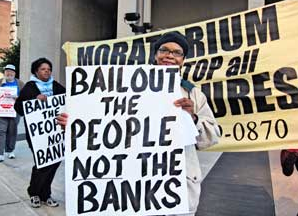
As previously discussed in Alliance reports, the housing crisis is over for some, but there are still millions of homeowners across the country struggling to pay off mortgages that are valued at more than the current worth of their homes. When combined with a sluggish labor market forcing many families to make due on less than before the recession, paying more than something is worth is not only dissatisfying, but often impossible.
In communities of color that still have high numbers of underwater mortgages, the effect on individuals overflows into the community, preventing entire neighborhoods from fully recovering from the recession.
During the height of the recession, there was sometimes a temptation to put the blame on borrowers who took out loans that they could not afford or with fine print they ignored, despite the fact that many homeowners were steered into these loans by banks looking to make a quick sale. Struggling homeowners were viewed as not smart with their finances and not reading or understanding the fine print, suggesting that it was the borrowers who needed to change.
As the crisis moved beyond subprime mortgages and property values dropped across the country, more and more “smart” people fell into foreclosure. Finally, the blame shifted appropriately to the banks, but solutions continued to focus on homeowners.
While helping homeowners directly through housing counseling and community outreach can be an important component of keeping families in their homes, it continues to put the onus on homeowners to connect with counselors or make sure their bank is giving them accurate information. The time has come to put at least some of the responsibility on banks – and give them a little incentive to be good actors.
As we’ve noted in past articles, some cities are pursuing the use of eminent domain to make banks renegotiate underwater mortgages and reduce the principal based on current market value – or lose the mortgage to a Community Development Financial Institution. When options like eminent domain are not legally feasible, cities can still take steps that encourage banks to change their business practices without putting the responsibility on homeowners to find solutions.
“More outreach will not solve the foreclosure and underwater mortgage crisis. Every homeowner faced with the possibility of losing their home looks for every program available to save their home,” said Chris Genese of Washington CAN! and Reset Seattle Coalition. “The problem is that the banks are not giving principal reduction to struggling homeowners. We must find solutions that truly achieve principal reduction.”
Some cities are already taking action to give banks a financial incentive to renegotiate mortgages through principal reduction and to work with homeowners to avoid foreclosure. Some of these tactics include instituting fees on foreclosures, issuing fines for blight on foreclosed homes, or campaigns to institute moratoriums on foreclosures. Such actions put responsibility on banks to act without putting additional pressures on the homeowner.
As cities like Seattle consider helping homeowners with underwater mortgages, they should consider whether they want stretched and stressed homeowners forced to negotiate with mega-banks with little hope of answers, or if it is time put the onus on the banks to finally take responsibility.